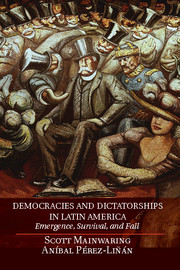Book contents
- Frontmatter
- Dedication
- Contents
- List of Tables
- List of Figures
- Acknowledgments
- 1 Introduction
- 2 A Theory of Regime Survival and Fall
- 3 Competitive Regimes and Authoritarianism in Latin America
- 4 Regime Survival and Fall
- 5 From Multiple Breakdowns to Stabilization of Democracy: Argentina
- 6 From Persistent Authoritarianism to a Durable Democracy: El Salvador
- 7 International Actors, International Influences, and Regime Outcomes
- 8 Political Regimes after the Third Wave
- 9 Rethinking Theories of Democratization in Latin America and Beyond
- Appendix 3.1 Coding Rules for Political Regimes
- Appendix 3.2 Coding U.S. Foreign Policy toward Democracy in Latin America
- Appendix 4.1 Long-Run Equilibrium for the Proportion of Competitive Regimes
- Appendix 5.1 Qualitative Comparative Analysis
- Appendix 6.1 Coding of Salvadoran Actors, 1979–2010
- Bibliography
- Index
8 - Political Regimes after the Third Wave
Published online by Cambridge University Press: 05 June 2014
- Frontmatter
- Dedication
- Contents
- List of Tables
- List of Figures
- Acknowledgments
- 1 Introduction
- 2 A Theory of Regime Survival and Fall
- 3 Competitive Regimes and Authoritarianism in Latin America
- 4 Regime Survival and Fall
- 5 From Multiple Breakdowns to Stabilization of Democracy: Argentina
- 6 From Persistent Authoritarianism to a Durable Democracy: El Salvador
- 7 International Actors, International Influences, and Regime Outcomes
- 8 Political Regimes after the Third Wave
- 9 Rethinking Theories of Democratization in Latin America and Beyond
- Appendix 3.1 Coding Rules for Political Regimes
- Appendix 3.2 Coding U.S. Foreign Policy toward Democracy in Latin America
- Appendix 4.1 Long-Run Equilibrium for the Proportion of Competitive Regimes
- Appendix 5.1 Qualitative Comparative Analysis
- Appendix 6.1 Coding of Salvadoran Actors, 1979–2010
- Bibliography
- Index
Summary
Our primary empirical purpose in this book is to document and explain the long-term transformation of political regimes in Latin America. For this reason, Chapters 4 through 7 focused on explaining two opposite processes: transitions from authoritarianism and the breakdown of competitive regimes. Changes in the likelihood of these processes, acting together, account for the wave of democratization experienced by Latin America after 1977.
This emphasis on basic regime types prevented us from analyzing subtler transformations within the set of competitive regimes. Figure 4.1 in Chapter 4 identified two important changes within the family of competitive regimes: the deepening of semi-democratic systems into full democracy and the erosion of democracies into semi-democratic politics. Although less dramatic, these transformations suggest that democratization is a latent, continuous process and that levels of democracy may vary considerably even within the set of competitive regimes.
An analysis of the different levels of democracy achieved by competitive regimes is crucial to understand the evolution of Latin America in the aftermath of the third wave. This analysis is our purpose in this chapter. In the first section we show that, although all countries in Latin America except for Cuba have experimented with competitive regimes in recent decades, the level of democracy varies considerably among them. Chile, Costa Rica, and Uruguay have established what are fairly widely regarded as high-quality democracies, whereas many other countries including Bolivia, Colombia, Ecuador, Guatemala, Haiti, Honduras, Nicaragua, Paraguay, and Venezuela today have significant infringements of at least one of the four defining features of democracy. Post-transition countries have followed different democratic trajectories, making contemporary Latin America a politically diverse region.
- Type
- Chapter
- Information
- Democracies and Dictatorships in Latin AmericaEmergence, Survival, and Fall, pp. 242 - 268Publisher: Cambridge University PressPrint publication year: 2014



